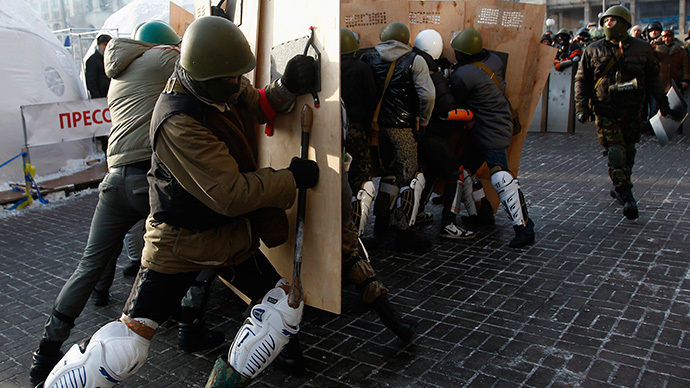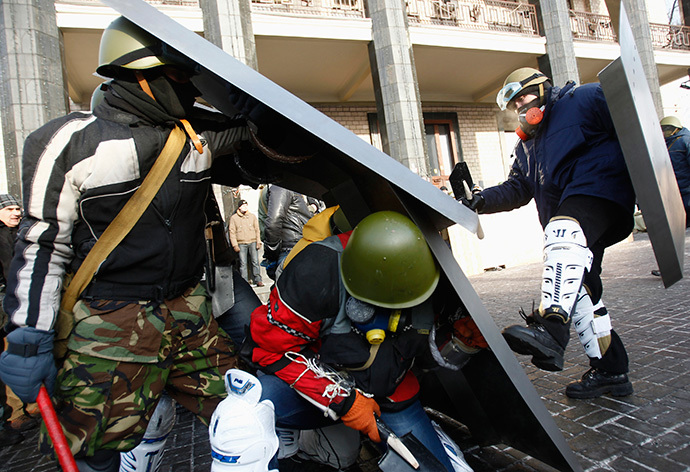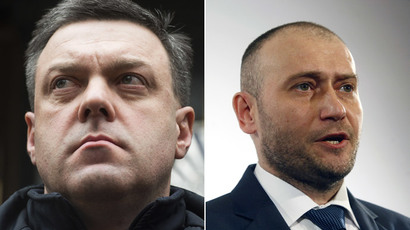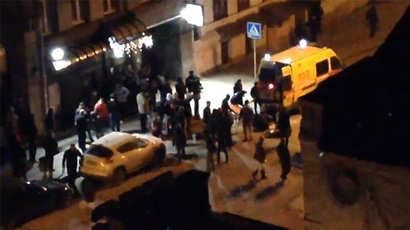Concerns as Ukraine’s govt hastily revamps Maidan squads into National Guard

The creation of Ukraine’s National Guard – the custodian of the coup-imposed government – has raised concerns that it may later be deployed to eastern regions of Ukraine to suppress the population increasingly standing up against Kiev.
Ukraine has established a National Guard which will be comprised of former and current Ukrainian troops and volunteers from Maidan self-defense squads. Its declared goal, according to the statement of the country’s parliament, is the protection of Ukrainians against external and internal aggression as well as ensuring territorial integrity of the country.
A decree enabling the creation of National Guard has already been signed by the coup-imposed President of Ukraine, Aleksandr Turchinov, after it was hastily passed by the parliament on Thursday. A total of 262 members of the Rada voted in favor of establishing the Ukrainian National Guard. According to the law, the National Guard's chief will be appointed by the Rada upon the recommendation of the acting president.
The Guard will be compromised of 60,000 men and women and its official tasks will be to protect and safeguard the lives, rights, freedoms and legitimate interests of citizens, society and the state from criminal and other unlawful acts. In addition, the guard will ensure public order in cooperation with law enforcement authorities, protect state borders, combat terrorism, as well as the suppress the activities of illegal paramilitary or armed organized groups or individuals.
The National Guard will be able to carry out the functions of any law enforcement agency in the post-coup country, as the existing agencies cannot be fully relied upon, considering the questionable legitimacy of the new rulers and the public discontent in eastern regions.
Ukraine previously established the National Guard in 1991 with a similar role, as the remnants of the former Soviet army were then considered unreliable. In 1995, it became the personal praetorian guard of President Leonid Kuchma. It was later disbanded in 2000.
Yet experts are already beginning to question the true motives behind the formation of the new combat force in Ukraine. Historian Vladimir Skachko argues that the Guard will be used to antagonize the Russian speaking population, and he has called the creation of the special force “legalization of neo-Nazi and neo-fascist batons.”
Citing historical examples from 20th century European history, Skachko draws a parallel with the SA, or Brownshirts, a paramilitary wing of the Nazi Party, which acted as death squads.
This theory appears to hold ground, considering the coming of extreme right-associated politicians to key posts in the coup-installed Ukrainian government.

The new secretary of Ukraine's Security Council, Andrey Parubiy, was one of the founders of the Neo-Nazi Social-National Party of Ukraine (SNPU), known as Svoboda party. Parubiy, according to numerous reports was in control of the building, from which snipers attacked the central Kiev in February.
Deputy Prime Minister Aleksandr Sych is also a member of Svoboda, which reportedly uses Nazi symbols, flying WWII era nationalist flags from the time when Ukrainian Nazis collaborated with Berlin. The self-imposed prosecutor general of Ukraine, Oleg Makhnitsky is also a member of Svoboda.
A 1999 report from Tel-Aviv University called the Svoboda party "an extremist, right-wing, nationalist organization which emphasizes its identification with the ideology of German National Socialism."
On Friday, Moscow launched a criminal investigation into Svoboda’s leader Oleg Tyagnibok for his alleged role in fighting Russian forces in Chechnya.
Another key figure is Dmitry Yarosh, the leader of the Right Sector, which was instrumental in setting up the National Guard forces. The Right Sector is an alliance of neo-fascist groups including UNA-UNSO, Patriot of Ukraine who allegedly fought against Russian troops in Chechnya and Moldova.
Russia placed Yarosh on an international wanted list and charged with inciting terrorism, after the Right Sector’s social page published an address to Doku Umarov, Moscow’s most wanted man, to attack Russia. Yarosh later said the page was hacked and the address was fabricated.
Meanwhile, the authorities in Kiev are trying to channel the neo-Nazi “combustible material” away from the capital, historian Vladimir Skachko believes. Most likely, he says they would be dispersed around Crimea.
The idea is supported by sources cited by the editor-in-chief of National Defense Magazine Igor Korotchenko, who told Komsomolskaya Pravda newspaper that ‘Maidan commissars’ have joined the ranks of the National guard.
“Rotation of forces is taking place, to move the military units to new locations. New authorized political representatives posts are created for those troops that are being sent to South-East and the Crimean borders,” Korotchenko said, claiming his information came from his Ukrainian sources.
The National Guard units, he says, would act as guardians of the coup leadership and ideals.
“Roughly speaking, these will be the commissars of the Maidan, people with executive functions and the right to dismiss field commanders in case of any suspicion of disloyalty to the new Ukrainian authorities,” the journalist elaborated, saying the troops will be deployed to those areas which seek greater autonomy from Kiev and might be used “against the population and the Self-Defense Forces of Crimea.”
Kiev’s continued economic struggles make some experts wonder who will support Ukraine’s military reform.
“Most of the financial assistance allocated to Ukraine by foreign countries, will focus on the establishment and maintenance of the National Guard of Ukraine,” former Deputy Minister of Defense of Ukraine, Vladimir Tereshchenko.
Tereshchenko says that financially supporting the Ukrainian Navy and army is being neglected by Kiev “thus emphasizing the priority of the domestic power structure” on the National Guard, which will receive the funds.














